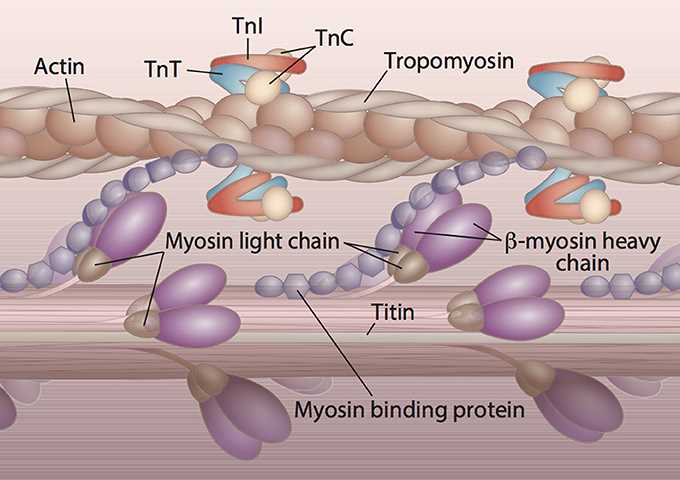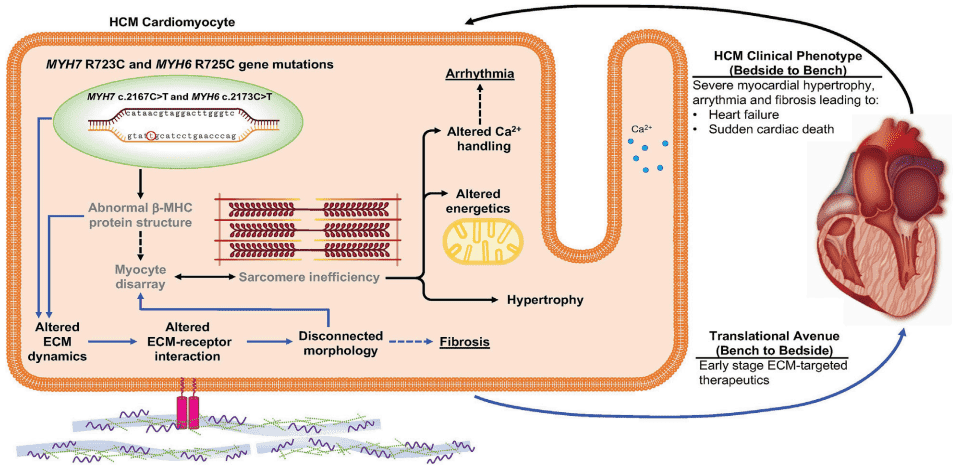NAA Services for Anti-MHC Antibodies
Along with years of rich experience in the field of natural autoantibody (NAA) research, Creative Biolabs is a leading service provider in the NAA services. At present, we provide a full range of anti-MHC antibody marker services for myocarditis diagnosis and therapeutic monitoring. Our state-of-the-art facilities and highly experienced staff are available in order to assist customers in the disease diagnosis and treatment in a quick turnaround.
Background of Anti-MHC Antibodies
Myosins represent a large family of motor proteins, which mainly involved in the hydrolysis of adenosine triphosphate (ATP) to generate the force required for the movement of actin filaments. Myosin heavy chain (MHC) serves as the motor protein of muscle thick filaments. Most organisms contain various muscle MHC isoforms with different regulated expression patterns. Generally, α isoform MHC specifically expresses in the atrial myocardium, but β isoform MHC expresses only in slow skeletal and ventricular myosin. Research showed that α and β MHC isoforms are autoantigens can be recognized by organ-specific cardiac autoantibodies. Besides, anti-α and anti-β MHC autoantibodies have been confirmed presenting in patients with myocarditis/dilated cardiomyopathy (DCM) and myosin-induced autoimmune myocarditis/DCM.
 Fig.1 Anatomical cross-sections of hearts with various forms of cardiomyopathy. (Kraker, 2016)
Fig.1 Anatomical cross-sections of hearts with various forms of cardiomyopathy. (Kraker, 2016)
The Role of Anti-MHC Antibodies in Myocarditis
The detection of anti-MHC antibodies of IgG class in myocarditis/ DCM patients has been demonstrated by several groups. The disease-specific anti-myosin antibodies in myocarditis/DCM sera are mainly of IgG3 subclass. In some studies, the anti-myosin antibodies were related to the deterioration of cardiac function. Besides, effects of anti-cardiac myosin autoantibodies from human DCM patients have been studied, the antibodies reduced the contractility capacity of electrical field-stimulated myocytes in a dose-dependent manner, but the restraint of contraction, expressed as a percentage of untreated cells, was independent of antibody titer. Myocytes treated with DCM antibodies showed rising peak systolic and diastolic levels in response to an increase in beating frequency. These in vitro results suggested that some of the anti-myosin antibodies, similar to other antibody specificities, may have a functional role in human myocarditis/DCM by influencing contractility of myocytes.
 Fig.2 The impact of sarcomeric gene mutations associated with β-MHC in mediating hypertrophic cardiomyopathy.2
Fig.2 The impact of sarcomeric gene mutations associated with β-MHC in mediating hypertrophic cardiomyopathy.2
Creative Biolabs has been dedicated to leveraging our cutting-edge technologies and expertise to facilitate all kinds of antibody-related projects. We are more than happy to provide professional assistance of services for anti-MHC antibodies to worldwide clients. Additionally, using our state-of-the-art technology platforms and professional expertise, prominent scientists in Creative Biolabs also offer a wide range of high-quality NAA products and NAA services, including NAA detection, NAA profiling, NAA affinity measurement, NAA epitope mapping, and paratope mapping.
Please feel free to contact us for more information.
References
- Kraker, Jessica, et al. "Recent advances in the molecular genetics of familial hypertrophic cardiomyopathy in South Asian descendants." Frontiers in physiology 7 (2016): 499.
- Hsieh, Jeanne, et al. "Myosin heavy chain converter domain mutations drive early-stage changes in extracellular matrix dynamics in hypertrophic cardiomyopathy." Frontiers in Cell and Developmental Biology 10 (2022): 894635.
Related Services:
- NAA Services for Anti-Sarcolemmal Antibody (ASA)
- NAA Services for Anti-Myolemmal Antibody (AMLA)
- NAA Services for Anti-Fibrillary Antibody (AFA)
- NAA Services for Anti-Interfibrillary (IFA) Antibody
- NAA Services for Anti-laminin Antibody
- NAA Services for Anti-β1 Receptor Antibodies
- NAA Services for Anti-M2 Receptor Antibodies
- NAA Services for Anti-HSP 70 Antibodies
- NAA Services for Anti-Tropomyosin Antibodies

